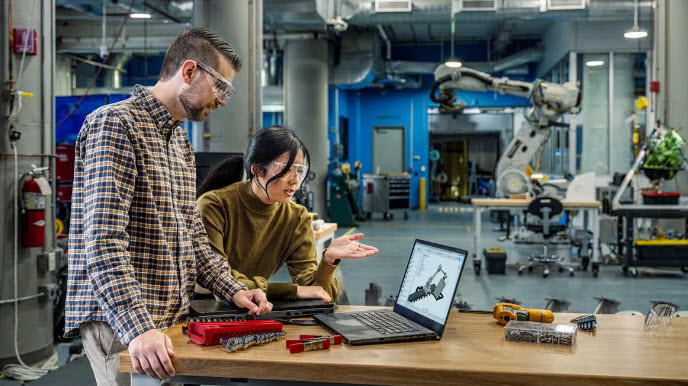& Construction

Integrated BIM tools, including Revit, AutoCAD, and Civil 3D
& Manufacturing

Professional CAD/CAM tools built on Inventor and AutoCAD
3 min read
This post is also available in: Deutsch (German) 日本語 (Japanese)
Explore the impact Industry 4.0 has on product design and manufacturing. Learn about key technologies driving this revolution and how Autodesk Fusion enables engineers to thrive in the new industrial landscape.
Industry 4.0 marks a paradigm shift in the product design and manufacturing landscape. Characterized by integrating digital technologies into industrial processes, Industry 4.0 has created smart factories and interconnected systems that significantly improve manufacturing productivity and efficiency. As we navigate this new era, engineers and product designers must understand the core concepts and technologies driving Industry 4.0, as well as their implications for the future of design and production.
Industry 4.0 represents a change in product design, manufacturing, and delivery. Fundamentally, this revolution is built upon a foundation of interconnected digital technologies that enable unprecedented levels of automation, data exchange, and real-time optimization. The key technologies driving Industry 4.0 include the Internet of Things (IoT), artificial intelligence (AI), cloud computing, and advanced robotics.
IoT forms the backbone by connecting physical devices, machines, and equipment to the digital world. Such connectivity facilitates real-time data collection and analysis. Thus, enabling manufacturers to monitor production processes, predict maintenance needs, and optimize resource allocation. Here, AI and machine learning algorithms can process the vast amount of data collected to identify patterns and insights. These insights help make autonomous decisions to improve efficiency and quality. Meanwhile, cloud computing provides the necessary infrastructure to store, process, and access this data from anywhere.

Advanced robotics and automation technologies are revolutionizing the factory floor. Collaborative robots, or cobots, work together with humans to handle repetitive or dangerous tasks while improving precision and productivity. These robots are becoming increasingly sophisticated, with enhanced sensing capabilities and the ability to adapt to changing production requirements.
Ultimately, the convergence of these technologies is enabling the creation of smart factories. Machines communicate with each other, production lines self-optimize, and products are customizable on demand. This level of integration and intelligence transforms traditional manufacturing processes to unlock greater flexibility, efficiency, and responsiveness to market demands.

Autodesk Fusion provides engineers and product designers with the tools they need to thrive in the ever-changing manufacturing landscape. Fusion’s cloud-based platform aligns with the principles of Industry 4.0 by offering a comprehensive solution that integrates design, engineering, and manufacturing workflows together.
One of Fusion’s key strengths is its ability to facilitate collaboration across teams and geographic locations. The platform’s cloud-based nature allows designers and engineers to access projects remotely, fostering real-time collaboration and enabling rapid iteration. This aligns with the Industry 4.0 principle of connectivity and data exchange, such that all stakeholders have access to the latest design information and can make decisions quickly.
Fusion Manage enhances project oversight, allowing manufacturers to exercise meticulous control over every phase, from inception to market launch. This guarantees that projects adhere to established timelines, budgets, and quality standards.
Fusion Operations provides essential data from the manufacturing floor directly to decision-makers. This enables swift responses to operational challenges and proactive management of production processes.
By leveraging Autodesk Platform Services (APS), manufacturers can tailor their digital environment to meet specific requirements. This ensures that tools and workflows are precisely aligned with their needs. This is achieved through the development of custom applications or the integration of existing systems, allowing manufacturers to address unique challenges effectively.
Enhancing operations through extensions and strategic partnerships brings advanced technology and external expertise into the Fusion platform. These collaborations drive innovation and ensure that Fusion stays at the cutting edge of technological advancements.
Industry 4.0 is ushering in a new era of smart, connected manufacturing that promises to revolutionize how products are designed, produced, and delivered. By embracing the technologies and principles of this fourth industrial revolution, engineers and product designers can create more innovative, efficient, and responsive products. Tools like Autodesk Fusion are necessary for this transformation, providing the digital capabilities needed to thrive in the Industry 4.0 landscape.
By clicking subscribe, I agree to receive the Fusion newsletter and acknowledge the Autodesk Privacy Statement.
Success!
May we collect and use your data?
Learn more about the Third Party Services we use and our Privacy Statement.May we collect and use your data to tailor your experience?
Explore the benefits of a customized experience by managing your privacy settings for this site or visit our Privacy Statement to learn more about your options.